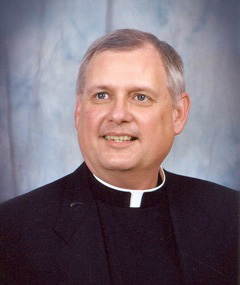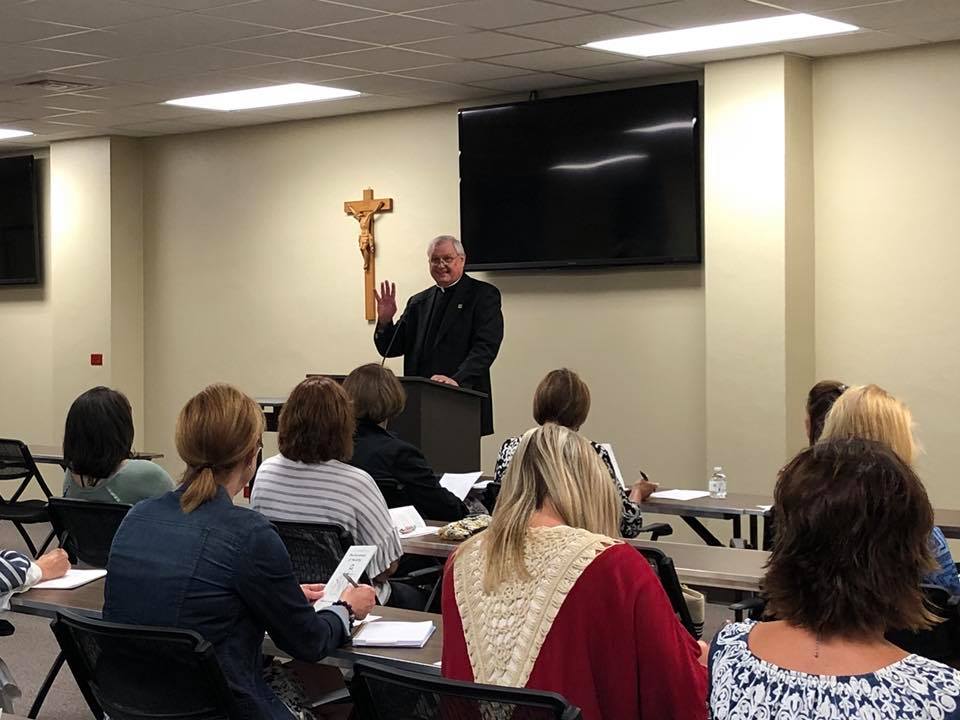LAFAYETTE, La. (KLFY)- Bishop J. Douglas Deshotel announced the removal of Robie Robichaux today. The priest allegedly abused a teenage girl between 1979 and 1981.
He was the Judicial Vicar of the Diocese of Lafayette.

With the assistance of the victim, an immediate investigation was launched when Deshotel said he learned about the allegations.
The alleged abuse was first reported to the Diocese in 1994, Deshotel said. “Though I was only made aware of them for the first time on Sept. 18, 2018,” he said.
“In 1994, the matter was handled according to the protocols in place at the the time, before the adoption of the Charter and the policy of zero tolerance,” the bishop stated.
In 2004, the victim asked that Robichaux be removed from ministry based on the zero-tolerance policy.
At that time, former Bishop Michael Jarrell sought a ruling on whether or not the plaintiff, who was 16 or 17 years old, “should be considered a minor or adult,” the bishop said.
“The Congregation for the Doctrine of Faith ruled that the complainant was considered to be an adult,” said Deshotel.

Robichaux was removed from office on Oct. 6, 2018, after the investigation was examined the Diocese’ Sexual Abuse Review Board.
“They unanimously advised me of their belief that the allegation had a semblance of truth,” Deshotel said.
The bishop commended the victim for coming forward and reiterated encouragement for others to do the same.
“I am grateful that this information was heard and touched the heart of the victim who came forward,” he said.
“We are deeply sorry that this has happened to any child.”
The alleged events happened more than 30 years ago, so essentially no charges can be filed.
Below is the entire statement from Bishop J. Douglas Deshotel:
“On September 18, 2018, I was informed of an accusation of sexual abuse of a minor by Monsignor Robie Robichaux, JCL which is alleged to have occurred to a female between the ages of sixteen (16) and eighteen (18) between 1979 and 1981. I immediately ordered Monsignor W. Curtis Mallet, JCL, Vicar General to conduct an investigation into the matter. At Monsignor’s recommendation, the matter was referred to the Sexual Abuse Review Board (composed entirely of lay professionals) who unanimously advised me of their belief that the allegation has the semblance of truth.
In keeping with the Charter for the Protection of Children and Young People and the Essential Norms, Diocesan Policy and Canon Law, the investigation was completed and Monsignor Robichaux was removed from his position as Judicial Vicar (head of the marriage tribunal) and placed on administrative leave on October 6, 2018.
I wanted to know the truth about what occurred or did not occur. I acted as quickly as possible in accordance with respect for justice and concern for the person who brought the complaint to our attention. I am releasing this information in conjunction and with the assistance of the complainant. I thank her for her courage in coming forward and assisting us in this investigation.
It is essential to state that these allegations were first reported to the Diocese in 1994, although I was only made aware of them for the first time on September 18 of this year. In 1994, the matter was handled according to the protocols in place at that time, before the adoption of
the Charter and the policy of “zero tolerance.” In 2002, the Charter and Norms established a “zero tolerance” policy, prohibiting a cleric against whom a credible allegation of sexual abuse of a minor was made to remain in ministry.
In a notarized statement, dated April 29, 2004, the complainant asked that Monsignor Robichaux be removed from ministry on the basis of “zero tolerance.” At that time, Bishop Michael Jarrell sought a ruling from the Congregation for the Doctrine of the Faith about whether or not the complainant (age 16-17) was considered to be a minor or an adult, according to canon law that was in effect at the time the alleged abuse occurred. The CDF ruled that the complainant was considered to have been an adult under canon law in effect at that time. State law would have considered her a minor at that time. The matter also should have been referred to the Layperson Sexual Abuse Review Board, which was standard practice at the time according to the Charter and the Norms, to advise him whether or not Monsignor Robichaux would have been suitable for ministry.
When I stated recently that no priest against whom a credible allegation of sexual abuse against a minor was made was in ministry in the Diocese, I did so in good conscience since I had no information to the contrary. At the same time, I invited anyone with information to the contrary to come forward. I again repeat that request. I am grateful that this invitation was heard and touched the heart of a complainant to come forward.
I am deeply sorry that this has happened to any child of God who has been abused by a priest. This is the opposite of what a priest should be in the lives of God’s people. The priest is supposed to be light, not darkness, in people’s lives. I realize that faith and trust can only be reestablished by seeking the truth and appropriate follow-up actions based on the truth. I, as the shepherd of this Diocese, am committed to
the Charter for the Protection of Children and Young People, which states that when “even a single act of sexual abuse of a minor—whenever it occurred—which is admitted or established after an appropriate process in accord with canon law, the offending priest or deacon is to be permanently removed from ministry.”
As I have done with this matter, I will do likewise with any and all credible accusations.
+J. Douglas Deshotel
Bishop of Lafayette”

